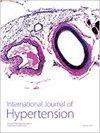MTHFR多态性与h型高血压的关系:诊断测试准确性的系统评价和网络荟萃分析
IF 1.7
4区 医学
Q3 PERIPHERAL VASCULAR DISEASE
引用次数: 0
摘要
目的MTHFR多态性与H型高血压(H-HTN)之间的关系已经通过流行病学研究进行了调查,但结果并不一致。因此,在文献综述和汇总分析的基础上对这种关联进行了系统评估,为单核苷酸多态性对H-HTN风险的影响提供了更有力的证据。方法3名研究者分别在PubMed、Embase、Cochrane Library、中国知网(CNKI)、中国科技期刊数据库(VIP)、万方数据库和中国生物医学文献数据库(CBM)中检索相关研究。选择固定或随机效应模型来计算合并优势比(or)和95%置信区间(CI)。诊断测试的网络荟萃分析和Thakkinstian算法被用于选择最合适的遗传模型,以及值得注意的关联的假阳性报告概率(FPRP)。所有数据均使用Stata 15.0和Meta Disc进行处理。结果我们共纳入了14项研究,涉及1759例MTHFR病例和1581例对照。在一项直接的荟萃分析中,我们发现MTHFR C667T rs1801133显著增加了H-HTN易感性的风险,但过量模型除外。然而,MTHFR A1298C rs1801131多态性与H-HTN风险无显著相关性。此外,MTHFR C667T rs1801133是估计H-HTN风险的潜在诊断生物标志物。结果表明,优势模型是排除疾病的最佳诊断模型,可以降低漏诊率,进一步提高疾病诊断的准确性。结论MTHFR C667T rs1801133多态性与H-HTN风险相关,可作为一种有前景的H-HTN危险性预测生物标志物。然而,需要进一步精心设计的研究来证实这些结果。本文章由计算机程序翻译,如有差异,请以英文原文为准。
Association of MTHFR Polymorphisms with H-Type Hypertension: A Systemic Review and Network Meta-Analysis of Diagnostic Test Accuracy
Purpose An association between MTHFR polymorphisms and H-type hypertension (H-HTN) has been investigated by epidemiological studies, but results have been inconsistent. Thus, a systematic assessment of the association was performed based on a literature review and pooled analysis, to provide stronger evidence on the effects of single nucleotide polymorphisms on H-HTN risk. Methods Three investigators independently retrieved relevant studies in PubMed, Embase, Cochrane Library, China National Knowledge Infrastructure (CNKI), China Science and Technology Journal Database (VIP), Wanfang Database, and China Biomedical Literature Database (CBM). A fixed or random effects model was selected to calculate pooled odds ratio (OR) and 95% confidence intervals (CIs). A network meta-analysis of diagnostic test and Thakkinstian's algorithm were used to select the most appropriate genetic model, along with false-positive report probability (FPRP) for noteworthy associations. All data were processed using Stata 15.0 and Meta-Disc. Results A total of 14 studies involving 1759 cases and 1581 controls for MTHFR were included in our meta-analysis. In a direct meta-analysis, we found that MTHFR C667T rs1801133 significantly increased the risk of H-HTN susceptibility except for an overdominant model. However, MTHFR A1298C rs1801131 polymorphism had no significant correlation with H-HTN risk. Besides, MTHFR C667T rs1801133 is a potential diagnostic biomarker for estimating H-HTN risk. The results indicated that the dominant model was an optimal diagnosis model for excluding diseases, which could reduce a missed diagnosis rate and further improve the accuracy of disease diagnosis. Conclusion The present result suggests that MTHFR C667T rs1801133 polymorphism is associated with H-HTN risk and may act as a promising predictive biomarker for H-HTN risk. However, further well-designed studies are warranted to confirm these results.
求助全文
通过发布文献求助,成功后即可免费获取论文全文。
去求助
来源期刊

International Journal of Hypertension
Medicine-Internal Medicine
CiteScore
4.00
自引率
5.30%
发文量
45
期刊介绍:
International Journal of Hypertension is a peer-reviewed, Open Access journal that provides a forum for clinicians and basic scientists interested in blood pressure regulation and pathophysiology, as well as treatment and prevention of hypertension. The journal publishes original research articles, review articles, and clinical studies on the etiology and risk factors of hypertension, with a special focus on vascular biology, epidemiology, pediatric hypertension, and hypertensive nephropathy.
 求助内容:
求助内容: 应助结果提醒方式:
应助结果提醒方式:


